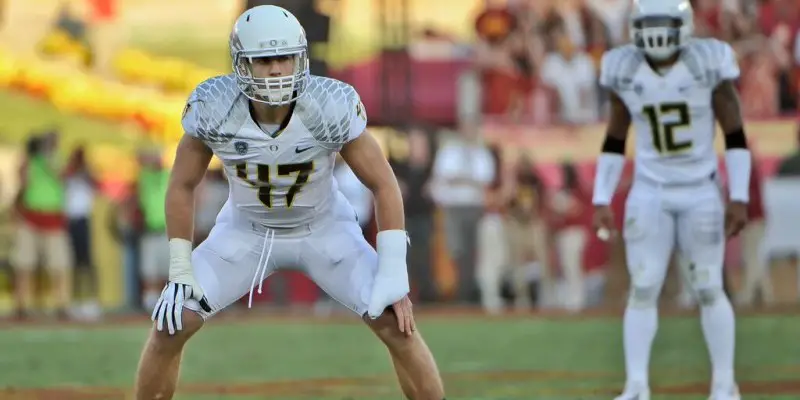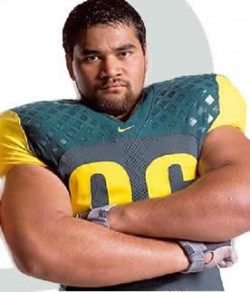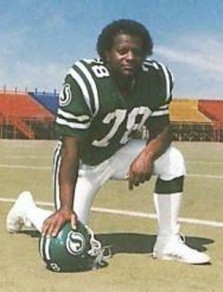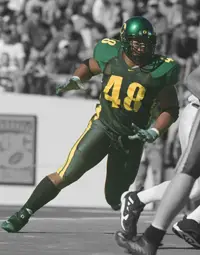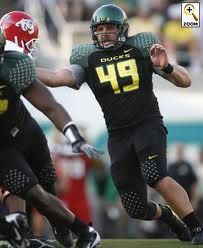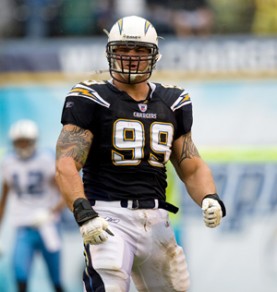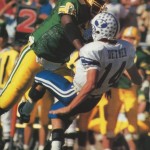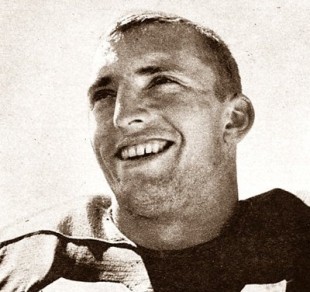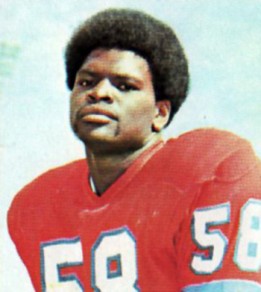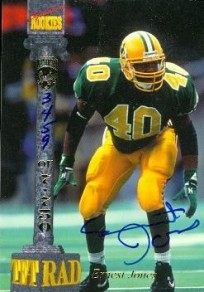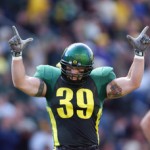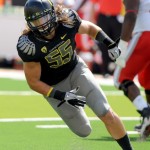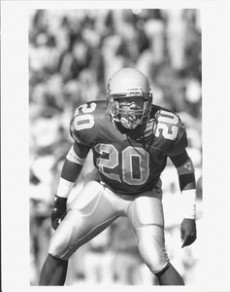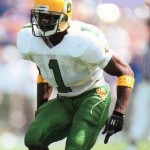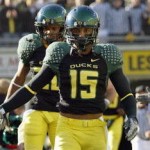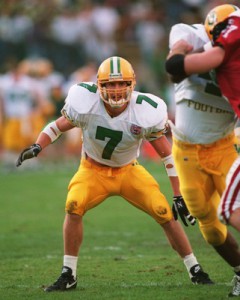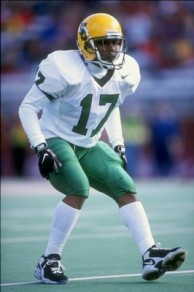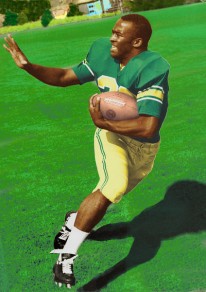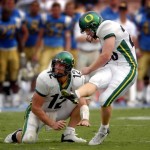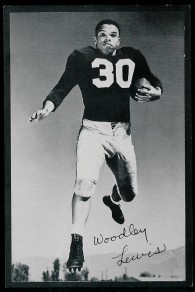For most of the past two decades, Oregon’s most successful stretch in history, the attention surrounding Oregon football has been focused on the high-powered offense. In recent years, it has been easy to forget that the Ducks have seen just as many outstanding defenders.
Exciting offensive players like LaMichael James and Jonathan Stewart may have spoiled fans in the modern era with their entertainment value, but watching Ernest Jones smother the quarterback, or Jairus Byrd cut in front of a receiver to make an interception can be just as captivating.
Just as it is with the offensive side of the ball, it is challenging to compare players on the defensive side when going back a few decades. Linebackers and defensive linemen are far bigger than they used to be, and defensive backs must be faster than in the past to keep up with today’s wide receivers. Decades ago, it was the norm to play on both sides of the ball, whereas in today’s college football world it is considered an anomaly to play both ways.
Nonetheless, the following roster is an attempt to identify the best defensive players in Oregon football history, based on each one’s talent, accomplishments, statistics, value, and NFL success.
Defensive Tackle: Haloti Ngata (2002-2005)
Few players have come to Eugene with higher expectations than defensive tackle Haloti Ngata, ranked by Rivals as the No. 2 player in the country after his senior year in high school.
The 5-star recruit lived up to the hype. During his freshman season, Ngata played in 12 games, earning a spot in the starting lineup by the fifth game of the year. That season, he earned first-team freshman all-American honors and the Len Casanova award for the team’s top newcomer.
Ngata missed the entire 2003 season after tearing his ACL in the first quarter of the opening game against Mississippi State, but recovered in 2004, earning all-conference honors. However, it wasn’t until the next season that he really reached his potential. In 2005, Ngata was a first-team all-American and the Pac-10’s defensive player of the year, recording 59 tackles (the most by a Pac-10 defensive lineman).
Standing at 6’5″ and 338 pounds, he had outstanding quickness for such a big body, capable of squatting 550 pounds. Ngata would forego his senior campaign, declaring for the NFL Draft where he was a mid-first round pick by the Baltimore Ravens. He has seen tremendous professional success including Pro Bowl selections in each of the last three years.
Defensive Tackle: Vince Goldsmith (1977-1980)
Given his 5’11”, 230-pound frame, it really is amazing how much success Vince Goldsmith found on the defensive line throughout his career.
It didn’t take long for Goldsmith to showcase his talent, recording 13 tackles in the first game of the 1977 season as a true freshman. Earning all-American recognition twice during his time in Eugene, Goldsmith was the only Oregon player ever to win the Morris Trophy for the nation’s best lineman.
Throughout his career, Goldsmith tallied 281 tackles, 34 of them for loss; truly impressive numbers for a defensive lineman. On top of his football career, the two-sport athlete also excelled in the shot put.
Goldsmith didn’t find the NFL success that many other Ducks have, but he played 10 years in the Canadian Football League after leaving Oregon. Unheralded and often forgotten playing in an era where Oregon was at its low point as a program, Goldsmith embodies the typical Oregon Duck standout…undersized in every area, except his heart.
Defensive End: Saul Patu (1997-2000)
Saul Patu escaped from a rough, gang-riddled area of South Seattle to come to Eugene, where he immediately found a home on the Ducks’ defensive line.
Patu was a menacing rusher who terrorized opposing offensive linemen for four years. At 6’3″ and 272 pounds, he had the size and athleticism necessary to disrupt the offensive backfield.
Patu’s numbers are some of the best in school history, leading the Ducks all-time in tackles for loss. Until the arrival of defensive end Nick Reed, who played from 2005-2008, Patu’s 26.5 sacks were the most ever by an Oregon defensive end.
After Oregon, Patu spent eight years in the NFL and the Arena Football League, and recently returned to Eugene as a pastor.
Defensive End: Nick Reed (2005-2008)
Nick Reed could be identified from a mile away with his odd, baggy t-shirt sleeves that exploded out of his tight jersey. Unfortunately for opposing offenses, that easy identification didn’t help them slow Reed down.
The Southern California native exploded onto the scene his sophomore year, starting the last 10 games of the season. As a junior in 2007, Reed was a huge part of the Ducks’ success, recording 22.5 tackles for loss and 12 sacks (good enough for third and eighth in the nation, respectively) on his way to all-American recognition.
Reed continued his production in 2008, wrapping up his career with 13 sacks (a school single-season record), and 20 tackles for loss. He also led the country in fumble recoveries with five, and was awarded first-team all-American honors.
The stellar defensive end was drafted in the seventh round of the 2009 NFL draft by the Seattle Seahawks, and is currently a member of the Minnesota Vikings. Because of his tenacity and will to disrupt plays in the backfield, Reed was one of the best defensive linemen Oregon has ever seen.
Backup Defensive Line: Devan Long (2002-2005)
Devan Long, a three-time all-conference defensive end, began to impress the nation in 2003 as a sophomore. He is one of Oregon’s all-time leaders in sacks with 24.5 and tackles for loss with 48. Long was extremely explosive and quick off the line of scrimmage, and his outstanding instincts make him one of the best pass-rushers in school history.
Backup Defensive Line: Igor Olshansky (2001-2003)
Originally from the Ukraine, Olshansky was nice enough to bring his talents to the west coast of the United States, and play football for Oregon. The towering 6’6″, 305-pound defensive tackle had only played organized football for three years before his arrival in Eugene, but that didn’t slow his production. Olshansky, who left after his junior season, had the talent to possibly top this list. A fan favorite, chants of “IIIGGGOOORRR!!” could be heard raining from the heavens above Autzen Stadium after every play the big man made. Igor was drafted in the second round of the 2004 NFL Draft by the San Diego Chargers, and he remains a productive lineman in the NFL today.
Backup Defensive Line: Kenny Rowe (2007-2010)
Kenny Rowe was a very successful pass-rushing specialist during his first two years with the Ducks, but he really took off as a junior in 2009. That season, he recorded 11.5 sacks and 15 tackles for loss on his way to honorable mention all-conference recognition, and won defensive MVP of the 2010 Rose Bowl despite the team’s loss. Rowe added 7 sacks and 16.5 tackles for loss in 2010, playing a key role in the team’s trip to the national championship game. Rowe’s athleticism was unrivaled for a player of his size, and he began the “drop-end” hybrid position utilized by the Ducks that Dion Jordan now occupies.
Honorable Mention Defensive Line:
Marcus Woods (1988-1991): Woods was a stout and powerful nose tackle who was very effective in the middle of the line. He was all-conference in 1991 as a senior.
Matt Brock (1985-1988): After a very impressive and consistent four-year career at Oregon, Brock played eight seasons in the NFL with the Green Bay Packers and New York Jets.
Mike Walter (1979-1982): Like Dave Wilcox, Walter converted to linebacker after a successful collegiate career at defensive end to play in the NFL. He played 12 seasons for the 49ers, over which time he won three Super Bowl rings.
Matt LaBounty (1988-1991): After a stellar career at Oregon, LaBounty played nine seasons in the NFL with the San Francisco 49ers, Green Bay Packers, and Seattle Seahawks before retiring in 2001.
Outside Linebacker: Dave Wilcox (1962-63)
Dave Wilcox is one of only two former Oregon defenders in the NFL Hall of Fame. A monster on both sides of the ball, he is one of the greatest players the Oregon football program has ever seen, and the lineage would be passed down to his sons, who both suited up for the Ducks.
Wilcox joined the Ducks after two years at Boise Junior College (now Boise State), and made an immediate impact. Aside from his dominance at defensive end, Wilcox accompanied Pat Matson and Dave Tobey on the offensive line to pave the way for the “Firehouse Four” backfield complete with Mel Renfro, Bob Berry, Lu Bain, and Larry Hill.
The 1963 season, which was a huge success thanks in large part to Wilcox’s contributions, culminated in a Sun Bowl victory over SMU, the team’s first bowl win since 1917.
Though Wilcox spent most of his time at defensive end at Oregon, he played 11 professional seasons at linebacker for the San Francisco 49ers. At 6’3″ and 240 pounds, Wilcox was extremely athletic and had an ideal body for an NFL linebacker. During his career, he made it to seven Pro Bowls.
Inside Linebacker: Tom Graham (1969-1971)
If numbers don’t lie, then Graham, it’s safe to say, was simply one of the best. He is at the top of just about every tackling statistic in school history, racking up an Oregon record 433 career tackles, including 206 in 1969 as a sophomore (also a school record).
A defensive standout on a team best known for its offensive weapons with Dan Fouts, Bobby Moore, and Bob Newland, Graham was the leader of an under-appreciated defense. A three-time All-American, Graham was one of the most physically-gifted players to ever don an Oregon uniform.
Looking at some of Graham’s single-game statistics, his numbers only get more impressive. He tallied at least 20 tackles in five games throughout his career, and ended his tenure with a 41-tackle performance that also included a fumble recovery and blocked kick.
Graham went on to play 10 seasons with the Denver Broncos, Kansas City Chiefs, San Diego Chargers, and Buffalo Bills after being drafted in the fourth round of the 1972 NFL Draft.
Outside Linebacker: Ernest Jones (1990-1993)
Ernest Jones was an extremely athletic player, and a threat to get to the quarterback every time he blitzed from his outside linebacker position in the Ducks’ 3-4 scheme.
Jones played for Oregon during a period off growing pains, as the Ducks had a combined record of 22-24 throughout his career. Despite the team’s mixed results, Jones found a habit of getting into the opposing team’s backfield and was one of the Ducks’ most valuable weapons.
A blitzing specialist, Jones is all over the school’s record books. Along with defensive end Nick Reed, Jones holds the school record for most sacks in a season with 13, which he achieved in 1993. He is also third all-time with 28 career sacks.
Jones had bad luck with injuries in the NFL, and was forced to retire after six seasons with four different teams.
Inside Linebacker: Kevin Mitchell (2001-2003)
Beloved, intimidating, and flat-out determined, Kevin Mitchell was perhaps the most trusted middle linebacker to ever play at Oregon. A true workhorse at his middle linebacker position, Mitchell flew around the field and delivered hits to anyone unfortunate enough to get in his way.
Mitchell’s three years as a starter proved his talent and consistency, averaging 110 tackles per year. He totaled 366 tackles and 44 tackles for loss over his career, and garnered all-conference recognition in both 2002 and 2003.
The linebacker quickly gained respect as a leader, and from opposing teams as a player. When Mitchell’s career was winding down, then head coach Mike Bellotti once said, “I wish we could just clone and replace him.”
Unfortunately, Mitchell didn’t find the NFL success that several other former Duck standouts have had. However, his leadership, consistency, and unyielding insistence to fly to the ball and make a play put him high up on the list of all-time Oregon greats.
Backup Linebacker: Joe Farwell (1989-1992)
A case could easily be made that Joe Farwell deserves to be a starter on this roster. Over his four-year career, Farwell started 44 games and led the team in tackles in three different seasons, the only Oregon player ever to do so. As a senior, he received the team’s Hoffman Award, given to the most outstanding player, and ended his career ranked third all-time on the school’s tackles leader board.
Backup Linebacker: Peter Sirmon (1996-1999)
During his four years in Eugene, Sirmon totaled 32 tackles for loss, good enough to place him in the school’s top-10 all-time. In the final game of his career (the 1999 Sun Bowl against Minnesota), he racked up 16 tackles, including an astounding seven for loss, leading the Ducks to a 24-20 victory over Minnesota. Sirmon played seven seasons with the Tennessee Titans in the NFL, totaling 343 tackles over that time.
Backup Linebacker: Casey Matthews (2007-2010)
Duck fans were thrilled when Casey Matthews decided to break his family’s tradition of playing football at USC and head up to Eugene. Matthews was a true leader and a rock in the middle of the Oregon defense for three years. He was a second-team all-American as a senior in 2010 and was presented with the Skeie’s Award for the team’s most outstanding player that same year.
Matthews totaled 245 tackles, 30.5 of them for loss, nine sacks, and four interceptions over his career as a three-year starter. His forced fumble against Auburn in the BCS Championship game is one of the signature moments in Oregon history.
Backup Linebacker: Bryan Hinkle (1977-1980)
Bryan Hinkle played behind Vince Goldsmith in the late 1970s. After an excellent career at Oregon, Hinkle went on to play 12 seasons for the Pittsburgh Steelers and recorded 22.5 sacks and 15 interceptions over that span, despite weighing only 215 pounds.
Honorable Mention Linebackers:
Jeremy Asher (1992-1995): A constant at middle linebacker, Asher was the core of some of the best Oregon defenses in recent decades.
Rich Ruhl (1991-1995): Ruhl accompanied Asher in the middle of some of the most successful defenses in the early 1990s, helping create the “Gang Green” defense.
Wesly Mallard (1998-2001): Originally a walk-on, Mallard had a tendency to make big plays and bigger hits throughout his career, and played seven professional seasons in the NFL.
Matt Smith (1998-2000): Like Sirmon, Smith was a terrorizing linebacker in the late 1990s and led the team in tackles during his senior season in 2000.
Cornerback: Kenny Wheaton (1994-1996)
“It is intercepted! Intercepted! The Ducks have the ball! Down to the 35, the 40! Kenny Wheaton’s gonna score! Kenny Wheaton’s gonna score! 20! The 10! Touchdown! Kenny Wheaton on the interception! The most improbable finish to a football game!”
That quote from radio announcer Jerry Allen during the now famous “play that changed Oregon football” is forever immortalized as The Pick before each game, and deservedly so. Undersized freshman Kenny Wheaton shifted the trajectory of the program into an era of unprecedented success when he intercepted Washington quarterback Damon Huard’s pass, returning it 97 yards to beat the Huskies propelling the Ducks to their first Rose Bowl since 1958.
Wheaton’s contributions to the program go far beyond this one play, however. Though he declared for the NFL Draft a year early (the first player in Oregon history ever to do so), Wheaton was able to lead the team in interceptions during all three years of his career (leading the conference in 1995) and led the team in tackles in 1996.
Wheaton played three seasons for the Dallas Cowboys from 1997-1999, and following rehab for a horrific knee injury had a lengthy career in the CFL, but has more recently settled down to focus on his Kenny Wheaton Foundation, which aims to supply aid to underprivileged children. Wheaton’s impact on the program is unrivaled, to this day one of the most beloved and recognizable Oregon players ever to don the uniform.
Cornerback: Alex Molden (1992-1995)
Alex Molden was perhaps the best cover corner that Oregon has ever seen. A smothering player, he bottled up receivers on the line of scrimmage, and was capable of closing down an entire half of the field.
Molden, who started 44 games during his four-year career at Oregon, was a key part of a dominant Ducks secondary in the early 1990s. He was an all-conference player in both 1994 and 1995, and was a first-team all-American in 1995.
It was a quarterback’s worst nightmare to throw in Molden’s direction. The four-year starter totaled a school record 60 pass breakups during his career and intercepted 11 passes (a total that would have been higher had quarterbacks been willing to throw in his direction more often).
Molden was selected 11th overall by the New Orleans Saints in the 1996 NFL Draft. He had a successful eight-year professional career, over which time he totaled 12 interceptions and 252 tackles.
Safety: Patrick Chung (2005-2008)
Like John Boyett, who would succeed him, Patrick Chung was the heart and soul of the defense throughout his career. He consistently played with everything he had, and always put up big numbers on defense for the Ducks.
Chung was the team’s second-leading tackler as a redshirt freshman in 2005, a season that also resulted in first-team freshman all-American honors. Throughout his four-year career, he earned all-conference and all-American honors multiple times.
The safety was the definition of consistent, starting 51 straight games for the Ducks in four years. Over that span, he totaled an outstanding 384 tackles, placing him fourth all-time and first among non-linebackers at Oregon. Chung also totaled nine career interceptions, and was outstanding in the return game as well.
The New England Patriots selected Chung at the end of the first round of the 2009 NFL Draft. For his heart, leadership, nose for the ball, and consistent production, Chung will be remembered as one of the greatest defensive backs in Oregon football history for a long time.
Safety: Chad Cota (1991-1994)
Chad Cota was a gifted player in every aspect of the game. He could tackle, cover receivers, rush the passer, and anything else his coaches and teammates needed him to do.
Cota was not the most physically impressive player on the team, but his value as the leader of the defense was priceless while easily recognized as one of the hardest-hitting players in Oregon history. A four-year starter, he totaled 329 tackles, good enough for sixth all-time in the school’s record books.
As a junior, Cota led the team in tackles with 89, and nabbed four interceptions. While the 1994 Oregon secondary was full of stars like Kenny Wheaton and Alex Molden, it was Cota that won team MVP that season, leading the Ducks to their first Rose Bowl in 37 years.
The all-conference and all-American safety went on to play eight seasons in the NFL with four different teams.
Backup Defensive Back: Anthony Newman (1984-1987)
Anthony “Q” Newman started for three years in the Oregon defensive backfield, living up to his expectations as a highly touted in-state recruit from Beaverton. Over the span of his career, Newman totaled 247 tackles, garnering both all-conference and all-American honors during his senior season. He was captain of the team for two years before moving onto a lengthy 12-year NFL career.
Backup Defensive Back: Jairus Byrd (2005-2008)
Jairus Byrd was one of the most dominant and impressive defensive backs ever to come through Oregon, despite playing out of position for his whole career—a natural safety forced to play cornerback. Starting 37 consecutive games, Byrd intercepted a total of 17 passes, only one behind George Shaw, the school’s all-time leader. Like Newman, Byrd started for three years, and chose to forego his senior season to head to the NFL, where he has enjoyed tremendous success for the Buffalo Bills as their starting safety, not cornerback.
Backup Defensive Back: Rashad Bauman (1998-2001)
Like Molden, Bauman is considered one of the best cover cornerbacks in school history. Starting opposite Steve Smith, another all-time great, Bauman ranks third all-time in school history with 55 pass breakups. He played five seasons in the NFL for the Cincinnati Bengals and Washington Redskins after being drafted in 2002.
Backup Defensive Back: Mario Clark (1972-1975)
Mario Clark made a big impact for the Ducks early on in his career, as he was the first true freshman ever to start at Oregon. After making the all-conference team twice during his tenure in Eugene and finishing his career seventh all-time in interceptions, Clark continued his immense success with the Buffalo Bills, where he intercepted 26 passes in eight seasons.
Honorable Mention Defensive Backs:
Steve Smith (1998-2001): Smith started opposite Bauman and impressed with 56 career pass breakups and 13 career interceptions.
Walter Thurmond III (2006-2009): Thurmond joined Byrd and Chung to complete an excellent trio in the defensive backfield, and was drafted by the Seattle Seahawks in the third round of the 2010 NFL Draft.
Eric Castle (1989-1992): Castle, who was an all-conference safety in 1991, finished his career at Oregon ninth on the all-time list in interceptions, and played four seasons for the San Diego Chargers.
Keith Lewis (2000-2003): A strong, hard-hitting safety, Lewis earned all-conference recognition three times in his career and has played for the 49ers, Cardinals, and Panthers since leaving Eugene.
All Purpose: George Shaw (1951-1954)
Some players in Oregon football history were too talented to exclude from the dream team, but too versatile to label. George Shaw is one of those players, as he was an all-American quarterback and the school’s all-time leader in interceptions with 18 as a defensive back. Shaw was drafted first overall as a quarterback in the 1955 NFL Draft by the Baltimore Colts where he started before an injury allowed his backup, Johnny Unitas, to take his spot. Shaw was Oregon’s first two-sport All-American, a standout on the baseball diamond as well.
All-Purpose: Mel Renfro (1961-1963)
Like Shaw, Renfro was a star on both sides of the ball. Aside from his 1,540 career rushing yards, Renfro excelled as a defensive back. The Dallas Cowboys drafted him in 1964, where he played for 14 years and recorded a franchise record 52 interceptions. Renfro joined Dave Wilcox in the NFL Hall of Fame in 1996 as only the second defensive Oregon player to earn the honor.
All Purpose: John Beckett (1913-1916)
John Beckett was a true iron man in the early days of Oregon football. While he was also an outstanding offensive lineman, Beckett dominated at defensive tackle. He was named MVP of the 1917 Rose Bowl, despite Shy Huntington’s four interceptions and two touchdowns.
All-Purpose: John “The Flying Dutchman” Kitzmiller (1928-1930)
John Kitzmiller weighed only 164 pounds, but he managed to stand out in both the offensive and defensive backfields. His nickname stemmed from his knack for getting to the ball and making spectacular tackles as a defensive back in the late 1920s.
All-Purpose: Jake Leicht (1945-1947): Jake Leicht’s accomplishments during his time at Oregon are among the most impressive in school history. The all-American halfback and defensive back recorded three interceptions in two different games, and is ranked second all-time behind Shaw in career picks. In 1947 he won the Hoffman Award for the team’s most valuable player, rightfully so given his overall skill on the gridiron.
Kicker: Jared Siegel (2001-2004): Jared Siegel was an extremely valuable and consistent weapon for the Ducks over his four-year career. Before LaMichael James came along, Siegel was the school’s all-time leader in points scored with 323. The All-American led the team in scoring during each of his four years, and is sixth all-time in career field goal percentage. His 59-yard field goal at UCLA remains a highlight-reel moment, a kick made before the half in a game Oregon would ultimately win 31-30. .
Backup Kicker: Nathan Villegas (1998-1999): Villegas is Oregon’s all-time leader in field goal percentage at 82.5 percent (33-40), and scored what was then a school record 117 points during the 1998 season.
Punter: Josh Bidwell (1995-1998): Josh Bidwell was a special teams standout during his time in Eugene, and went on to a very successful career in the NFL. After surviving testicular cancer, he won the starting punter job for the Green Bay Packers and went to the 2006 Pro Bowl after being signed by the Tampa Bay Buccaneers.
Kick Returner: Woodley Lewis (1948-1949): Woodley Lewis remains Oregon football’s kick return average leader with a whopping 34.1 yards per return. He also recorded the school’s longest punt return (92 yards) and kickoff return (102 yards) during his career. He remains a trailblazer in another important way, as the first African-American ever selected in the NFL draft.
Punt Returner: Cliff Harris (2009-2011): While Harris’ career ended in an ugly way getting kicked off the team in 2011 after several off-field incidents, his abilities in the return game were undeniable. Harris was a threat to score every time he touched the ball, and earned all-American honors in 2010 when he returned four punts for touchdowns. His career also ended with some infamy, as his final play as a Duck involved him fielding a punt and inexplicably running backwards into the end zone where he was tackled for a safety vs. Colorado, the only points the Ducks would give up in the 45-2 blowout.
Oregon Defense: A Storied Past
While the team itself knows the value of its defense, it is easy for the Oregon fan base at large to overlook it in comparison to the program’s elite offenses in recent years. The offense may make the highlight reels, but it is Oregon’s bend-but-don’t break and big-play defenses that have made the difference in all of Oregon’s success.
Players such as Dave Wilcox, Haloti Ngata, Alex Molden, and all of the other names on this dream team roster prove that the Oregon football program has had an equally impressive track record on the defensive side of the ball.
While, of course, this roster is not the final say on the best of the best, all of these players–for one reason or another–were among the elite at their position in school history.
Related Articles:
Joey Holland graduated from the University of Oregon in 2013, majoring in History. He played several sports in high school, though football remains his passion. He has yet to miss a single Oregon Ducks home football game during his time in Eugene. Joey has written previously for Bleacher Report and Football Nation.
Joey welcomes your feedback.

